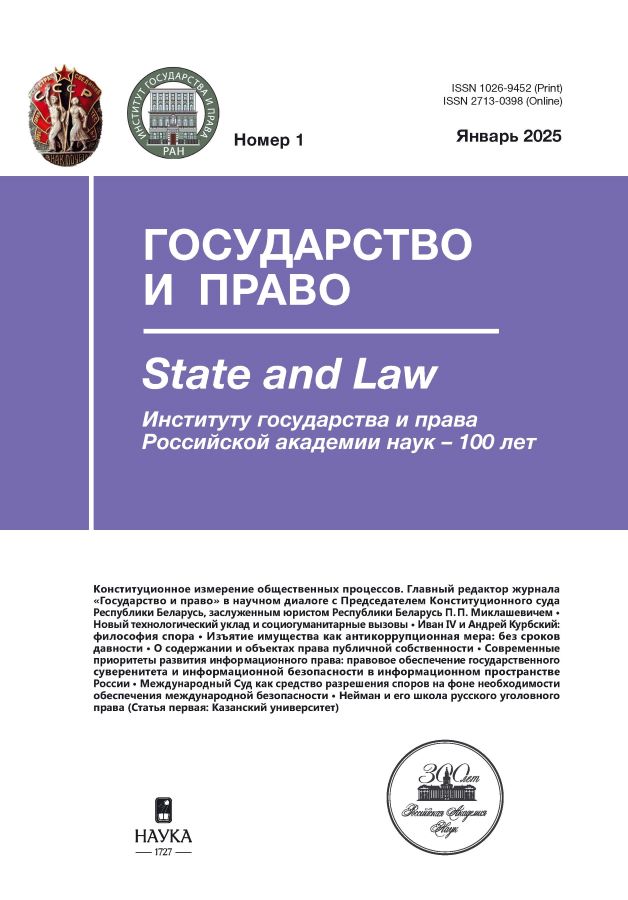Problems and prospects of the evolution of the constitutional system of the Russian Federation
- Authors: Skuratov Y.I.1, Selikhov N.V.1
-
Affiliations:
- Gubkin Russian State University of Oil and Gas
- Issue: No 1 (2025)
- Pages: 74-81
- Section: Constitutional law of Russia
- URL: https://ter-arkhiv.ru/1026-9452/article/view/678452
- DOI: https://doi.org/10.31857/S1026945225010069
- ID: 678452
Cite item
Abstract
The article discusses the impact of the global crisis of representative democracy and liberal capitalism on the renewal of the constitutional system of the Russian Federation, the formation of a state of social solidarity. In this process, civil self-government is becoming the most promising form of social self-organization of the Russian people, based on universal political equality of citizens. The right of the people to a national ideology, direct political communication of citizens and everyone’s participation in the governance of the State creates a modern basis for its unity and sovereignty. Social solidarity as a national idea, a constitutional principle and the basis of democracy, acquires a practical sound and presupposes Russia’s transition to a new level of popular support. The renewal of Russian statehood is a key condition for its survival.
Full Text
About the authors
Yuri I. Skuratov
Gubkin Russian State University of Oil and Gas
Author for correspondence.
Email: skuratov_yi@mail.ru
Doctor of Law, Professor, Head of the Department of Public Law and International Legal Provision of National Security
Russian Federation, 65 Leninsky Ave., 119991 MoscowNikolay V. Selikhov
Gubkin Russian State University of Oil and Gas
Email: selihovnv@mail.ru
PhD in Law, Associate Professor of the Department of Public Law and International Legal Provision of National Security
Russian Federation, 65 Leninsky Ave., 119991 MoscowReferences
- Vasilieva T. A. The Constitutional Assembly in Ireland: deliberative democracy in action // Comparative Constitutional Review. 2022. No. 6. Pp. 46–70 (in Russ.).
- Helvetius K. A. On the mind. M., 1938. P. 17 (in Russ.).
- Dugi L. Society, personality, state. St. Petersburg, 1914. P. 46 (in Russ.).
- Kokotov A. N. The Constitution of Russia and ideology // Current problems of Russ. Law. 2023. Vol. 18. No. 12 (157). P. 11 (in Russ.).
- Constitution and human rights: modern doctrine and practice. M., 2021. Pp. 68–85 (in Russ.).
- Liu Yan. Deliberative Democracy in China // Theories and Problems of Political Studies. 2020. Vol. 9. Iss. 3A. Pp. 83– 89 (in Russ.).
- Mamut L. S. The state as a publicly organized people // Journal of Russ. Law. 2000. No. 3. Pp. 88–100 (in Russ.).
- Nersesyants V. S. Philosophy of Law: libertarian-legal concept // Questions of philosophy. 2002. No. 3. Pp. 3–15 (in Russ.).
- Parkhomenko R. N. Theory of deliberative democracy Yu. Habermas // Philosophy and Culture. 2012. No. 4. Pp. 40–49 (in Russ.).
- Perfiliev M. N., Orlova L. V. Social relations: methodological problems of research. L., 1973. Pp. 95–138 (in Russ.).
- Saint-Simon A. Collected works. M. – L., 1948. P. 136 (in Russ.).
- Fomichenko M. P. The rights of peoples in the Russian Federation (constitutional and legal aspects): dis. … Doctor of Law. M., 2006 (in Russ.).
- Habermas Yu. Philosophical discourse on modernity. M., 2008. Pp. 8, 13 (in Russ.).
- Spengler O. Prussianism and Socialism. M., 2002. P. 47 (in Russ.).
Supplementary files










